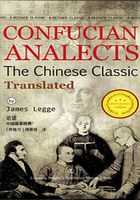
CHAPTER 2
The Master said, "Those who are without virtue cannot abide long either in a condition of poverty and hardship, or in a condition of enjoyment. The virtuous rest in virtue; the wise desire virtue."
HEADING OF THIS BOOK.—里仁第四. 'Virtue in a neighbourhood—No. IV.'—Such is the title of this fourth Book, which is mostly occupied with the subjects of 仁. To render that term invariably by benevolence, would by no means suit many of the chapters. See II. 1,2. Virtue, as a general term, would answer better. The embodiment of virtue demands an acquaintance with ceremonies and music, treated of in the last book; and this, it is said, is the reason why the one subject immediately follows the other.
1. RULE FOR THE SELECTION OF A RESIDENCE. According to the 周礼, 5 families made a 邻, and 5 邻 a 里, which we might style, therefore, a hamlet or village. There are other estimates of the number of its component households. 处, up. 2d tone, a verb, 'to dwell in'. 知, up. 3d tone, is the same as 智, 'wise', 'wisdom'. So, not unfrequently, below. Friendship, we have seen, is for the aid of virtue (I.8.3), and the same should be the objects desired in selecting a residence.
2. ONLY TRUE VIRTUE ADAPTS A MAN FOR THE VARIED CONDITIONS OF LIFE. 约, 'to bind', is used for what binds, as an oath, a covenant; and here, the metaphor being otherwise directed, it denotes a condition of poverty and distress. 利, 'gain', 'profit', used as a verb,=贪, 'to desire', 'to covet'. 安仁, 'to rest in virtue', being virtuous without effort. 利仁, 'to desire virtue', being virtuous because it is the best policy. Obs. how 者 following 仁 and 知 makes those terms adjectives. 不可, 'may not',=不能, 'cannot'. The inability is moral.
